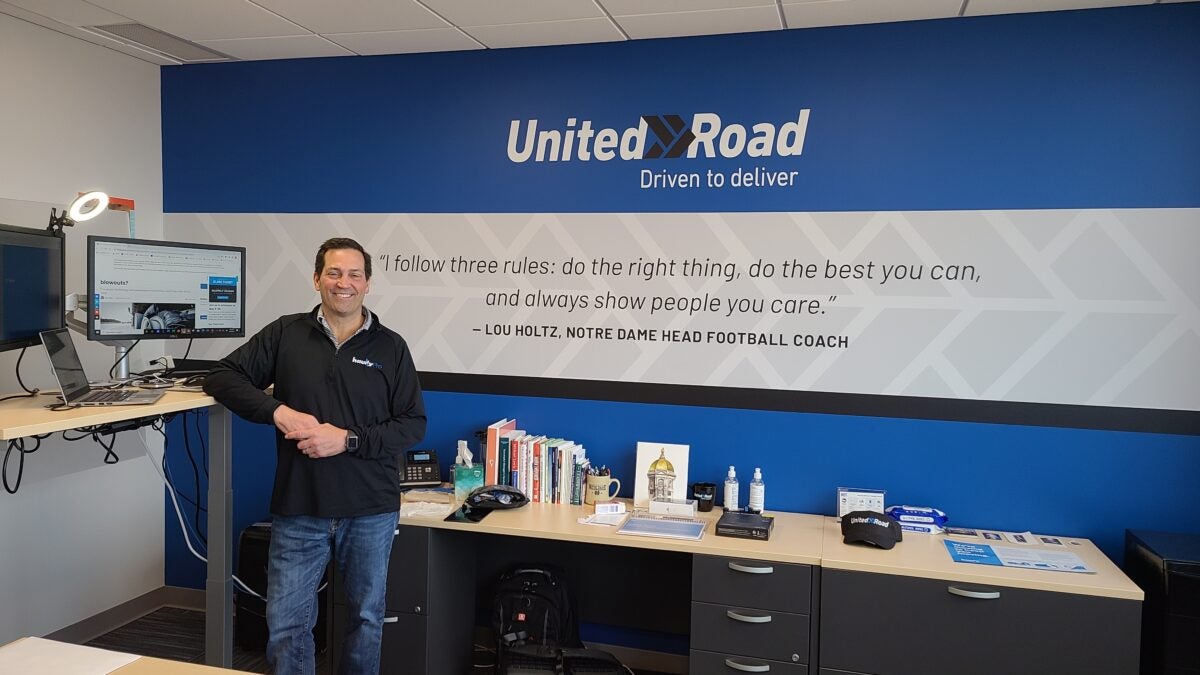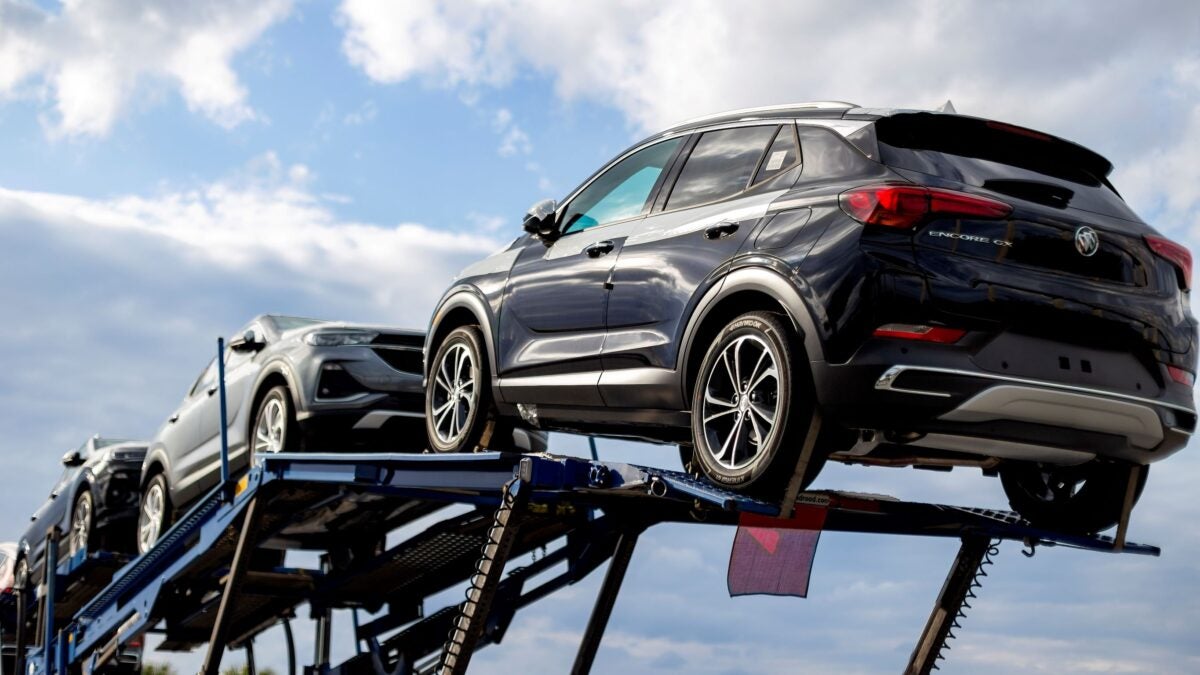PLYMOUTH, Mich. — Mark Anderson draws a triangle on a piece of paper and labels the three points A, B and C, illustrating how his company choreographs the movement of 4 million cars and trucks a year.
But the pandemic and the supply chain crisis played havoc with the model, creating a huge efficiency problem for the president and CEO of United Road Services.
“We go from point A and we have a plant here and we send trucks this way to point B where there’s a port. And we get trucks there and we go to point C where there’s a rail. And then we send them back to point A,” Anderson said as he scribbled on the triangle.
“But when the plant in point A shuts down because there’s no semiconductors. we’re like, ‘Uh-oh, how do I get here?’ If I just send my trucks here, I’m not generating any revenue, I just have costs. I’ve got to pay my driver. Fuel’s going through the roof. My drivers can go and do an easier job and make more money working at Amazon.”
Driver retention in car hauling
United Road has seen an uptick in its turnover to about 40% from 25% to 30% a year, still well under trucking’s 80% turnover at 60 days in Q3 2021, according to Stay Metrics. The gap between the typical truck driver hauling a 53-foot trailer and a car hauler has shrunk to where “they are evenish,” Anderson said.
Watch now: Retaining car-hauling drivers as wages reach parity with other jobs
United Road driving jobs are pushing $90,000 to $100,000 a year, up from about $85,000 two years ago. Car haulers are among the best paid among truck drivers because of the geospatial skills needed to safely load and unload vehicles. A new car hauler needs 10 months of training after earning a commercial driver’s license.

Used vehicle moves
Like the Realtor’s mantra of location, location, location, Anderson repeats another word three times: diversification.
Typically, that refers to the three forms of trucking United Road uses, 1,100 of its own fleet of mostly Peterbilt Model 579s and 900 company drivers; another 900 independent contractors operating under United Road’s Department of Transportation authority; and some 5,000 third-party partners that operate under their own authority.
Diversity has another definition at the Plymouth, Michigan-based company owned by the private equity giant Carlisle Group.
With the semiconductor shortage forcing the cancellation of hundreds of thousands of units of light vehicle production — and creating an estimated $60 billion loss for automakers globally in 2021 — United Road expanded into moving used cars and trucks from rental car lots to auctions and to resellers like CarMax and Carvana.
“We pivoted and said, ‘OK, where are the opportunities? Some companies shut their doors. We went to their customers and said, ‘Hey, we’ll haul your freight. Give it to us and we’ll deliver it,’” Anderson said. “We’re just finding other avenues of auto sources to get us from A to B. The goal is to stay loaded.”
Adopting unfamiliar work
“When production stops, you still have a backlog of about three weeks of cars that are on the ground. And this was a period of uncertainty. As things evolved, some businesses like rental cars were in survival mode. They had to sell their inventories to get cash just to survive.”
So United Road drivers began shuttling cars from out-of-the-way rented parking lots to auctions and other locations.
“It’s very different work because there’s a lot of single units as opposed to full loads,” Anderson said of the auction environment.
It wasn’t neat. And it wasn’t always pretty. But the unfamiliar work preserved a lot of the 1,700 jobs at United Road. It also created spot freight opportunities for its third-party haulers. The downside was it contributed to inefficiency. Anderson had to pay 120% of his contract rate to keep some vehicles moving.
In the process of chasing work where it existed, United Road became the first car hauler to handle new and remarketed units, he said. A 2019 acquisition of Team Drive-Away, which transports Class 8 and heavy-duty equipment, has since been sold to focus on car hauling.
Emerging from the trough
As the new car industry begins to emerge from the trough of its pullback, Anderson sees United Road’s prospects brightening, albeit amid a few manufacturing shutdowns for missing microchips or other parts.
“There used to be an average of 60 days of inventory of new cars,” Anderson said. “Now the average is like 20. And for some, there are single digits of inventory.”
Even with an increase in the seasonally adjusted annual rate of car sales from 12.9 million in December to 15 million in January, 2022 will be a tough year. Experts predict a rebound to 16 million units in 2023 and 17 million in 2024.
“We still have gone out and leased cars and the leases are still going to expire. So we have to go out and get another car,” Anderson said. “Now the goal is, as the new car comes back, hang on to that used car volume and grow with the new car volume.”

But that could be difficult because United Road, like all fleets, faces limits on how many new trucks it can purchase. The same semiconductor issue that impacted its customers is a barrier to United Road’s growth.
“We can’t replenish the fleet as frequently as we would like because our orders keep getting pushed out and out and out,” Anderson said. “We’re not happy about that.”
No use complaining
Complaining to the manufacturer is fruitless. United Road orders approximately 120 new trucks a year. Its five-year trade cycle is at risk of growing longer.
“By the time it’s all said and done over a three-year cycle, we’ll have skipped a year in there,” Anderson said. “So, where we would’ve ordered about 350 over a two-year period, it’s going to end up probably being closer to 200 or 220 over a three-year period because of [a lack of] availability. They’re putting customers on allocation is what they’re doing.”
Fortunately, United Road has 17 dedicated maintenance facilities. It is also a strong believer in AI from Chicago-based software-as-a-service company Uptake, which provides predictive maintenance alerts.
“People have bought into the technology because it works,” Anderson said. “They trust it and they know if they don’t they’re going to be broken down and then we have to tow it to another shop, maybe not our own.”
Related articles:
Future view: United Road bets on Uptake predictive maintenance
United Road adds heavy haul trucks to car carrier business
Won’t get fooled again: Manufacturers avoid overbooking Class 8 orders







